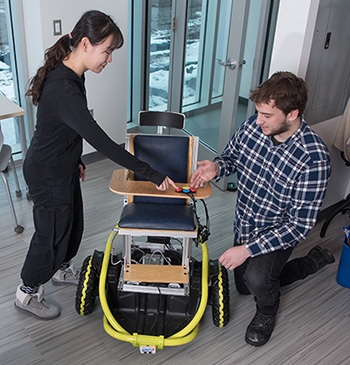For the past several years, Union engineering students have been working to design a replicable wheelchair for children that’s reasonably priced and easy to use by retrofitting the Power Wheels Wild Thing, a Fisher-Price battery-powered vehicle.
“Small kids without the ability to walk need a low-cost training power wheelchair. It’s not a simple thing to build in a way that can be easily duplicated,” said Cherrice Traver, the David Falk and Elynor Rudnick-Falk Professor of Computer Engineering.
Commercial power wheelchairs typically cost more than $10,000, making them too expensive for wide usage in physical therapy and rehabilitation programs. To address this problem, Lam Ngo ’18 and Joe Caruso ’18 began designing the first version of a replicable chair as their senior capstone project in fall 2017.
Ngo adapted the control interface, while Caruso created and constructed flexible seating customizations. They delivered a prototype to the Langan School at the Center for Disabilities in Albany, N.Y., the following spring.
The next year, Pyae Sone (Patrick) Aung ’19 developed an improved version of the control system as his senior thesis, the UMobility Project. He also created an easily replicable open-source product that would be accessible to a wide range of clients.
Currently, Traver is advising Benjamin Davis ’21, an electrical engineering major, and computer engineering major Yueyin (Susy) Su ’22, who are working on enhancements on the wheelchair structure.
“This project gives me a chance to solve a problem with real world implications,” says Davis. “It’s nice to be able to apply learned skills outside the classroom.”

